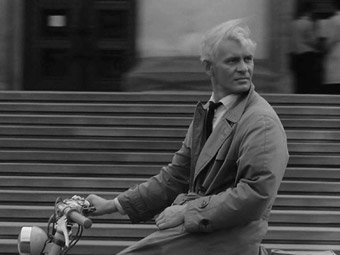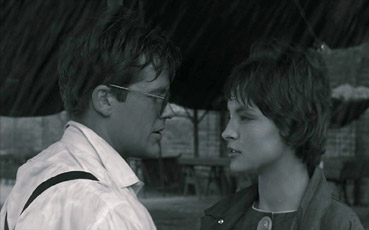|
Andrzej Wajda's Innocent Sorcerers unwinds like an early-60's Before Sunrise, charting the overnight affair shared by au courant scamps Bazyli and Pelagia. Tadeusz Łomnicki plays Bazyli, the laconic twentysomething whose shabby, albeit trendy apartment perfectly mirrors his modish, rumpled image (all untucked smolder, kinda like a young Rutger Hauer). Wajda introduces the character by way of a stunning long take, during which we observe the apartment's chaotic décor during the trail of his morning routine; the Einstein snapshot tacked over fermenting pots and pans, an aged desk cluttered with hardback books and records, the stalactite bulb, sans shade, hanging from the peeled ceiling A sports doctor by day, Bazyli jams with his jazz ensemble after hours (look out for Roman Polański on double bass), answering to the nickname "Medicine Man". He's swooned over by an attractive journalist (Kalina Jędrusik), but she'd be too easy a conquest for this lax lover, who's still being stalked by an obsessive flame, Mirka (Wanda Koczeska).
It's not long before Bazyli is prowling the bar with dynamo pal Edmund (Zbigniew Cybulski), but their attentions fall on the same girl. After a failed taxi trick (one of the film's biggest laughs) Edmund zooms off into the night, leaving our protagonist alone with Pelagia (Krystyna Stypulkowska), the cropped coquette who will tease, and perhaps steal, his heart. In the hours before dawn they play cat-and-mouse games with each other's feelings, talk of love and life, and indulge in perhaps the sexiest foreplay scene in cinema history. It's interesting to note that Innocent Sorcerers was shot simultaneously alongside À bout de soufflé arguably the kick-starter of France's nouvelle vague. Poland never had a 'New Wave', and yet Wajda's film seems to typify the progressive spirit of such an uprising. It's got the style too. Playing the iconic miscreant Poiccard, Jean-Paul Belmondo became the epitome of 'cool' with his poised, sultry performance, but Łomnicki's own chain-smoking rebel is far more alluring; his glassy, flickering eyes smothering a wellspring of ambition.

This maverick sensibility can likely be attributed to co-writer Jerzy Skolimowski (the celebrated auteur behind recently-recovered UK drama Deep End), who was hired by Wajda and Jerzy Andrzejewski to modernize the screenplay, and authenticate the voice of its central characters. Of course, this voice came under fire from many factions who were not yet ready to accept the attitudes of this new generation, and in his accompanying essay, The Best Of Youth, Michael Oleszczyk quotes from a fascinating letter sent to Wajda by the Catholic Church's Department Of Pastoral Advice, condemning the film's depiction of "chaos, laziness, filth, boredom, daydreaming and self-pity" – the very reasons for which it resonated with the post-war youth, and remains such a cooly compelling snapshot of blossoming bohème romance. In fact, it could be the greatest first date movie of all time.
Considered an undiscovered masterpiece by some native critics, Goodbye, See You Tomorrow felt to me like Zbigniew Cybulski's self-indulgent attempt to redefine the star image (he was frequently referred to as the 'Polish James Dean') cultivated by his iconic turn in Wajda's Ashes And Diamonds undoubtedly the most celebrated of his career. The actor co-wrote this picture with Bogumil Kobiela and Wilhelm Mach, and takes the lead role as Jacek, a hopeless romantic lusting after the heart of a dull socialite named Marguerite (Teresa Tuszyńska), who made me pray for the return of Innocent Sorcerers' Pelagia. That film, released just six months after Goodbye, treads much the same ground, as both concern the blossoming romance of an inner-city couple set against the backdrop of post-war Poland. But where Wajda's masterpiece had charm and subversion, Janusz Morgenstern's romance feels cumbersome and impassive, bogged down by the ambitions of its leading man, who plays against type with little success.
It's not a bad film per se, just an incredibly average one, and in a way that's worse. There's huge potential in Goodbye's concept, but just no spark to bring it alive, no chemistry between its stars, and no reason to care about the outcome of their relationship. It's telling the scenes of Jacek performing with the Bim Bom theatre company are more involving than his conversations with Marguerite, as they are purely expressive and dynamic; the complete antithesis of Jacek and Marguerite themselves. As they wander across the city, (again foreshadowing Before Sunrise), the screenplay exposes its banality, finding nothing for the characters to talk about but themselves – most of these conversations have in fact already evaporated from my mind.

During her meet-cute with Jacek, Marguerite reveals her fondness for tennis (one could be forgiven for assuming it's all she thinks about), so we are treated to the film's most genuinely sweet moment, as the young man claims to be a pro, scoring a date but then exposing himself as a fumbling amateur. It's an affectingly honest little scene, soon interrupted by Roman Polański cha-cha-cha'ing and tossing off chat-up lines in badly dubbed English. Structurally the film is completely disjointed, floating through time with without any real dramatic hook to keep us interested. There's just no fluidity, although some would call this approach "lyrical", and compare it to the work of France's nouvelle vague. I wish it could have struck that note with me, but as it is Goodbye, See You Tomorrow is a crushing disappointment in an otherwise essential collection.
For a DVD of a film shot in 1960, the transfer on Innocent Sorcerers is little short of astonishing. Framed in its original 1.33:1 aspect ratio, the sharpness and detail really are at the high end of DVD capability, and the tonal range on the brighter scenes is genuinely lovely. The print is also spotless, suggesting some careful restoration work has been carried out here. Many of the scenes feel a little dimmed down, but this looks very much like a conscious decision on the part of Wadja and his collaborators. The image is matched all the way by the polished Dolby 2.0 mono soundtrack, whose clarity and dynamic range belie the film's age.
It's a similar story with the 1.66:1 anamorphic transfer on Goodbye, See You Tomorrow, a virtually spotless restoration of close to pristine quality with an excellent level of detail and punchy contrast. The beefy black levels do occasionally swallow a little fine detail, but even in darker scenes the image is clear and the greyscale range is once again very attractive. The Dolby 2.0 mono soundtrack has clearly been restored and is impressively clear, with no hint of distortion and hardly a trace of background hiss in even the quietest scenes. The occasional sound effect – the rain in the market square, for example – lack the punch of the dialogue, but this is presumably how they were recorded and mixed.
Innocent Sorcerers
An exclusive 20-minute interview with Wajda, in which he discuss the foundation of and critical reaction to the 'Polish Film School'. It's a lively chat, and the director still shows a passion for filmmaking despite his 86 years of age (his latest, Walesa, is scheduled for an October release in Poland). The accompanying 16-page essay is authored by scholar Michal Oleszczyk, and dedicated to the memory of composer Krzysztof Komeda. It's an in-depth piece about the social landscape into which Innocent Sorcerers was released, contextualizing the film politically and, most interestingly, shedding light on the response from critics and church members, the latter of which deplored Wajda's depiction of youthful excess.
Goodbye, See You Tomorrow
Unfortunately there are no extras on the disc, but given the rarity of Morgenstern's film – and the sad fact that most involved in its production have now passed away – this was perhaps to be expected. There's another 16-page essay from Michael Brooke though, who does a great job of contextualizing the film socially and politically, but also discussing it within Cybulski and Morgenstern's careers. It's a detailed, highly readable piece, dedicated to Morgenstern's memory, and should definitely be checked out before watching the feature.
Second Run's impeccable presentation of these previously obscure titles make for essential viewing, and even though this critic was divided by Goodbye, See You Tomorrow, it still makes for a fascinating bedfellow with Andrzej Wajda's brilliant Innocent Sorcerers. Taken together, these films shed light on the emerging voice of the 'Polish Film School', the next two entries in this collection confirming their vitality.
|